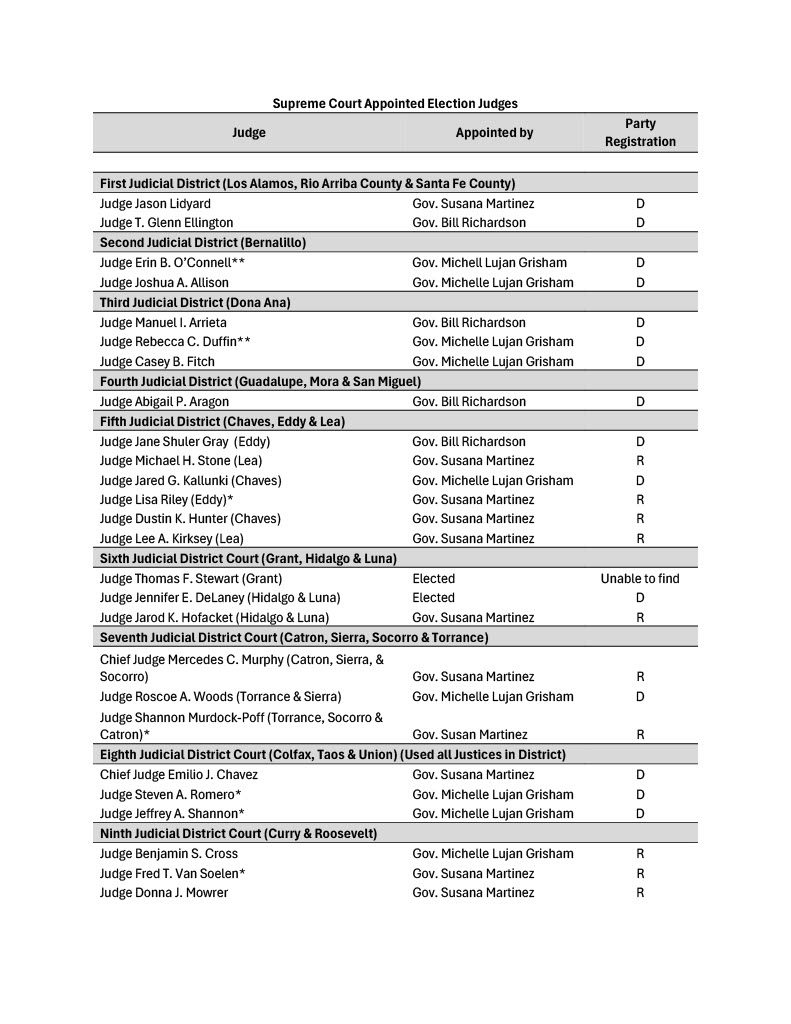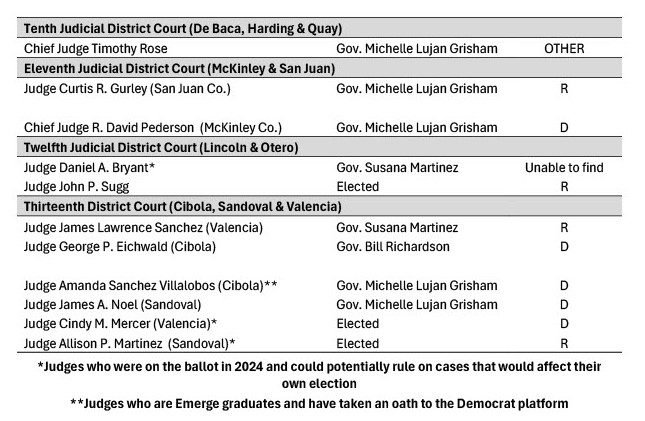In a disturbing move that erodes public trust, the New Mexico Supreme Court quietly issued Order No. 24-8110 on May 2, 2024. This order significantly constrains the selection of judges assigned to oversee election-related cases during the primary and general elections. Alarmingly, candidates, election observers, and other stakeholders were unaware of the order’s existence until a legal challenge surfaced in the Thirteenth Judicial District.
This secret move strips plaintiffs of the fundamental right to a fair hearing by potentially putting judges with undisclosed political biases or conflicts of interest in crucial election cases. The elimination of the right to peremptory excusal, no-questions-asked judge change, poses serious questions about having cases heard by a judge free from conflicts of interest or overt political bias.
Supreme Court Order 24-8110 sent from NM Supreme Court
The Supreme Court’s directive mandates the designation of certain district judges as “Election Judges,” who are tasked with handling election contests, ballot impoundment, recount proceedings, and mandamus cases across New Mexico. Details about the rationale for how judges were chosen have not been published, leading to questions about the transparency and motivations of the process.
Stakeholders in the electoral process must have full and immediate access to all Supreme Court orders that lay down the rules for election oversight. Without such access, there is continued erosion of trust in the electoral process and the judiciary’s role in safeguarding democratic principles. An IPRA seeking information on how Election Judges were chosen was submitted but has not been answered as of publication.
Thanks to the influence of EMERGE, New Mexico’s judiciary has shifted much farther left than its people. In judicial matters, especially those as consequential as elections, fairness and transparency is paramount.
The table below lists the judges who were assigned by the Supreme Court to oversee election-related cases in each district. Some of these judges were on the ballot in 2024, meaning they could potentially be tasked with ruling on a case involving their own election. Three of the judges are EMERGE graduates.


From the table, 20 of the judges are Democrats (54 percent), 14 of them are Republicans (32 percent), and two did not have stated party affiliations. Contrasting these numbers with the political makeup of the state – only 43 percent of New Mexicans are registered Democrats, and 32 percent are registered Republicans. Skewing the balance of election judges toward Democrats further undermines the public’s confidence that election cases will be fairly considered.
The only reason the order has been made public is because Ali Ennenga, a legislative contestant, filed an election contest in the Thirteenth District court. Ennenga was initially assigned Judge James A Noel, who Ennenga moved to excuse because of past indications of political bias. She was initially granted the excusal, and another judge was assigned but Ennenga’s excusal was then denied by Judge Noel based on the Supreme Court’s order.
The order effectively removes a long-held right for plaintiffs to reject judges from presiding over their cases without stating a reason, providing a layer of protection against potential biases. This is called the “right to peremptory excusal of assigned judges”. The removal of this right, only in election cases, confirms fears of diminished fairness in the political environment where the impartiality of a judge can significantly impact the perceived integrity of election outcomes.
The concerns are not just theoretical but are grounded in practical realities, as seen in the 13th Judicial District. Here, election-related cases are unfolding in a context where the assignment of judges has shown a noticeable partisan imbalance. With a majority of judges affiliated with one political party and one is an alumni of Emerge, the potential for perceived bias is substantial, especially without the safeguard of peremptory excusals. This situation underscores the importance of balanced representation on the bench to maintain the judiciary’s impartiality and public confidence.
- Opinion | SB 218—New Mexico’s Promise Made, Promise Broken - February 24, 2025
- New Mexico’s Supreme Court Ignores Rights and Restricts Who Can Hear Election Cases - January 9, 2025
- Progressive Blueprint: How EMERGE’s Legislative Surge is Poised to Reshape New Mexico - January 6, 2025


